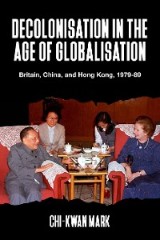Details

Decolonisation in the age of globalisation
Britain, China, and Hong Kong, 1979-89|
144,99 € |
|
| Verlag: | Manchester University Press |
| Format: | EPUB |
| Veröffentl.: | 25.07.2023 |
| ISBN/EAN: | 9781526171313 |
| Sprache: | englisch |
| Anzahl Seiten: | 280 |
DRM-geschütztes eBook, Sie benötigen z.B. Adobe Digital Editions und eine Adobe ID zum Lesen.
Beschreibungen
In the 1980s, Britain actively engaged with China in order to promote globalisation and manage Hong Kong’s decolonisation. Influenced by neoliberalism, Margaret Thatcher saw Britain as a global trading nation, which was well placed to serve China’s reform. During the negotiations over Hong Kong’s future, British diplomats aimed to educate the Chinese in free-market capitalism. Nevertheless, Deng Xiaoping held an alternative vision of globalisation, one that privileged sovereignty and socialism over market liberalism and democracy. By drawing extensively upon the declassified British archives along with Chinese sources, this book explores how Britain and China negotiated for Hong Kong’s future, and how Anglo-Chinese relations flourished after 1984 but suffered a setback as a result of the 1989 Tiananmen Square crackdown. This original study argues that Thatcher was a pragmatic neoliberal, and the British diplomacy of ‘educating’ China yielded mixed results.
Drawing extensively on the declassified British archives and Chinese sources, this book explores how Britain and China negotiated for Hong Kong’s future, and how Anglo-Chinese relations flourished after 1984. This original study argues that Thatcher was a pragmatic neoliberal, and the British diplomacy of ‘educating’ China yielded mixed results.
<p>Introduction<br>1 Anglo-Chinese relations, 1979<br>2 Globalisation without decolonisation? Hong Kong, 1979–81<br>3 Not for (re)turning: Thatcher meets Deng Xiaoping, 1982<br>4 Bargaining for sovereignty and administration, 1982–83<br>5 Negotiating autonomy and continuity, 1984<br>6 Anglo-Chinese relations and postcolonial globalisation, 1985–86<br>7 Democratisation and its limits, 1985–89<br>Conclusion<br><br><i>Index</i></p>
Chi-kwan Mark is Senior Lecturer in International History at Royal Holloway, University of London
<p>In the 1980s, Britain actively engaged with China in order to promote globalisation and manage Hong Kong’s decolonisation. Influenced by neoliberalism, Margaret Thatcher saw Britain as a global trading nation, which was well placed to serve China’s economic reform. With her conviction in free-market capitalism, Thatcher was eager to extend British rule in Hong Kong beyond 1997. During the 1982-84 negotiations, British diplomats aimed to ‘educate’ China about how capitalist Hong Kong worked. Nevertheless, Deng Xiaoping held an alternative vision of globalisation, one that privileged sovereignty and socialism over market liberalism and democracy.<br><br> Drawing extensively upon the declassified British archives and Chinese sources, the book recounts how Britain and China negotiated for Hong Kong’s future, culminating in the signing of the Joint Declaration on its retrocession in 1997. It explores how Anglo-Chinese relations flourished after the Hong Kong agreement but suffered a setback as a result of the 1989 Tiananmen Square crackdown. This original and comprehensive study argues that Thatcher was a pragmatic neoliberal, and the British diplomacy of ‘educating’ China in global free trade and democracy yielded mixed results.<br><br> By examining Britain-China-Hong Kong relations from multiple perspectives, this book will be of interest to scholars and students in the fields of diplomatic, imperial, and global history.</p>

















